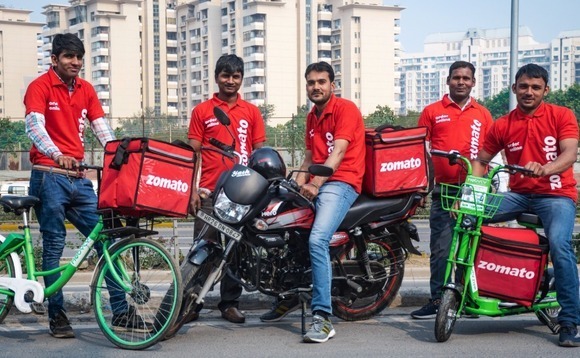
AVCJ Awards 2021: Exit of the Year – IPO: Zomato

Zomato’s milestone offering last year saw a pandemic-ready business model awaken the local market to internet-based risk profiles as global investors shifted interest from China to India
The INR 93.7bn (USD 1.2bn) IPO last year by Indian dining platform Zomato was only the country's fifth-largest PE-backed listing, but few transactions, if any, have had as many directly traceable market-wide knock-on effects.
The most obvious of these ramifications was the wave of pre-profit technology IPOs that ensued on domestic stock exchanges, a heretofore unpalatable concept for local regulators and investors alike. The likes of Oyo, Paytm, Mobikwik, PolicyBazaar, Delhivery, and Nykaa have all followed suit.
The momentum in turn triggered a surge in pre-IPO fundraising, with several local GPs targeting the strategy for the first time. This has been interpreted as not only a reaction to a market event but a fundamental shift in mindset across government, high net worth individuals (HNWIs), retail investors, and institutions at a time when flatlining interest in China tech has added shine to the local ecosystem from a global perspective.
Mohit Bhatnagar, a managing director at Sequoia Capital India, one of Zomato's earliest backers, described the IPO as myth-busting in terms of confirming the long-term viability of fast-growing companies. This is in addition to its potential to motivate India's incalculable population of would-be entrepreneurs.
"Deepinder [Goyal] is a founder who is self-made, from a small town in India, Muktsar," Bhatnagar said. "Hopefully, this will inspire the next generation of entrepreneurs, who instead of taking professional roles in established companies are able to create their own companies."
Pandemic beneficiary
Sequoia secured a liquidity event alongside Ant Group, Baillie Gifford, Bow Wave Capital Management, D1 Capital Partners, Dragoneer Investment Group, Fidelity, Glade Brook Capital, Kora Management, Shunwei Capital, Temasek Holdings, Tiger Global Management, Uber, and Vy Capital. Info Edge India was the largest shareholder at the time with 18.5%; it first invested in 2010, two years after Zomato's establishment.
A significant amount of their windfall was tied to COVID-19, which not only lifted operational metrics for Zomato's food delivery service, it made the brand a household name. The retail portion of the IPO was 7.5 times oversubscribed.
The allocations for HNWIs and qualified institutional buyers (QIBs) were oversubscribed 33 times and 52 times, respectively. QIBs represented INR 41.9bn of the offering, with 186 anchor investors, including GIC, Abu Dhabi Investment Authority, Canada Pension Plan Investment Board.
"This has fuelled our ambitions further and we are now thinking about how we can create a USD 10bn business by revenue in a few years' time," Goyal said in November regarding the groundswell in unicorn creation supported by these investors. "The paradigm for India has changed within a year and that gives us a new opportunity to build a much bigger Zomato than what we dreamt of a year ago."
Zomato – which currently trades 17% above its IPO price with a market capitalisation of USD 9bn – appears to be rallying around its core interests rather than diversifying, having recently announced plans to double down on food and hyperlocal e-commerce. It said India's food delivery market alone had the potential to grow 10x over the next few years.
"We are adamant that we will not let our IPO change anything, and we aren't going to morph into a QSQT business," Goyal added, referencing "Qayamat Se Qayamat Tak," the Hindi cinema blockbuster that has become local shorthand for short-termism. "We will continue to focus relentlessly on the long term."
Latest News
Asian GPs slow implementation of ESG policies - survey
Asia-based private equity firms are assigning more dedicated resources to environment, social, and governance (ESG) programmes, but policy changes have slowed in the past 12 months, in part due to concerns raised internally and by LPs, according to a...
Singapore fintech start-up LXA gets $10m seed round
New Enterprise Associates (NEA) has led a USD 10m seed round for Singapore’s LXA, a financial technology start-up launched by a former Asia senior executive at The Blackstone Group.
India's InCred announces $60m round, claims unicorn status
Indian non-bank lender InCred Financial Services said it has received INR 5bn (USD 60m) at a valuation of at least USD 1bn from unnamed investors including “a global private equity fund.”
Insight leads $50m round for Australia's Roller
Insight Partners has led a USD 50m round for Australia’s Roller, a venue management software provider specializing in family fun parks.







